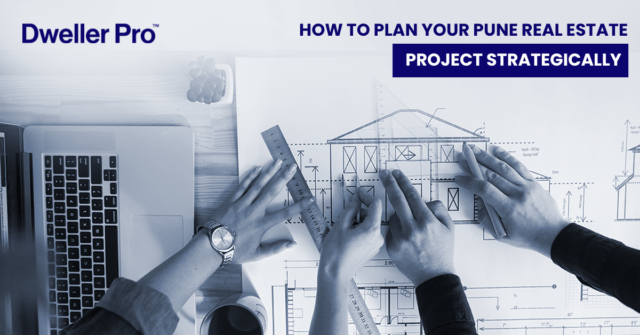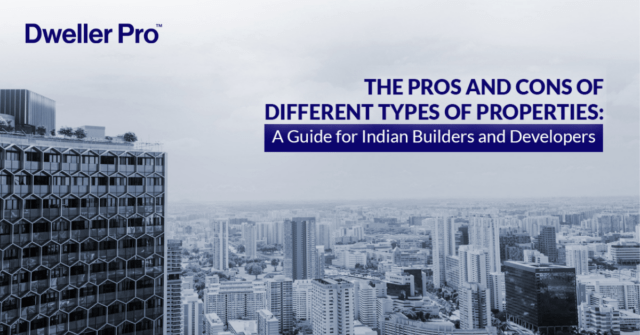Pune, a rapidly developing metropolis, presents a goldmine of opportunities for real estate developers. However, with a dynamic market and fierce competition, crafting a winning sales and marketing strategy is crucial for success.
This guide looks into the world of strategic planning and partnerships, empowering Pune developers to dominate the Pune real estate space and transform their projects into market leaders.
Understanding the Pune Real Estate Market
The Pune real estate market is experiencing a period of transformation, with people from all walks of life moving into the big cities to achieve their dreams and buy a comfortable home, at this junction, the real estate market is booming like never before. Here are some key facts to consider for the developers in such a time:
1. Rising Demand
A report from IBEF states that a growing middle class with increasing disposable income is driving demand for residential properties, particularly in tier-1 cities like Pune.
2. Shifting Demographics
Another report from JLL India states that younger generations prioritise lifestyle amenities and co-working spaces, influencing project design and marketing strategies.
3. Digital Revolution
Lastly, the Indian consumer is becoming increasingly tech-savvy. As per Knight Frank, digital marketing, virtual tours, and online lead generation are becoming essential for reaching potential buyers.
Strategic Planning for Real Estate Developers In Pune
A well-defined strategic plan serves as the foundation for your sales and marketing efforts. Here’s how to create a winning roadmap:
1. Market Research & Target Audience Identification
This is the first and most important step while devising a strategic plan for your project. The factors that fall under this are:
- Pune Specifics: Analyse Pune’s demographics, economic growth, infrastructure development, and upcoming projects to understand local demand drivers. You can check out our blog on “Top Real Estate Trends in Pune for Developers in 2024” for more information.
- Buyer Personas: Define your ideal customer profiles. Are you targeting young professionals, families, or investors? Each group has unique needs and preferences.
2. Project USP & Value Proposition
Your project has to come with a USP to be noticed by potential buyers in Pune. The vital points here are:
- Stand Out From the Crowd: Identify your project’s unique selling proposition (USP). Is it a prime location, innovative architecture, or sustainable features?
- Focus on Value: Clearly articulate the value your project offers. Highlight how it aligns with your target audience’s aspirations and lifestyle.
3. Build a Compelling Marketing Mix
A convincing marketing strategy will bring you buyers from all across the nation. Once your project USP is set, focus on the marketing strategy using these pointers:
- Digital Dominance: Develop a user-friendly website with high-quality visuals and virtual tours. Utilise search engine optimisation (SEO) and targeted online advertising to reach potential buyers. Leverage social media platforms like Facebook and Instagram to showcase your project and engage with the community.
- Offline Strategies: Don’t underestimate the power of traditional marketing channels. Participate in property exhibitions, partner with local media outlets, and consider print advertising in relevant publications.
- Content is King: Create informative and engaging content through blog posts, infographics, and videos that address your target audience’s pain points and showcase your project’s benefits. Our blog on “Building a Strong Brand Identity for Your Development Project in Pune” can help you strengthen your marketing.
4. Sales Enablement & Training:
Your sales team handles all the handover procedures, make sure you have a stable and well-operating team for this task. The factors here are:
- Empowering Your Sales Team: Equip your sales team with in-depth knowledge of the project, competitor analysis, and effective negotiation skills. Train them on the latest digital sales tools and techniques.
Adapting & Evolving in Real Estate
The Indian real estate market is constantly evolving. Here are some ways to ensure your sales and marketing strategy remains relevant:
1. Embrace Technology
Continuously explore and adopt new technologies like virtual reality (VR) and augmented reality (AR) to provide immersive experiences for potential buyers. For more information on technological applications in real estate, check out “Tech Revolution in Pune Real Estate: A Developer’s Guide”
2. Data-Driven Decisions
Don’t just rely on gut instinct. Leverage data analytics to understand customer behaviour and optimise your marketing efforts.
3. Focus on Customer Experience
Prioritise customer service throughout the buying journey. Offer transparent communication, timely updates, and address their concerns promptly.
4. Sustainability Matters
Highlight your project’s green initiatives and energy-saving features. Sustainability is becoming an increasingly important factor for Indian buyers.
5. Community Building
Foster a sense of community by organising events, creating social media groups, or collaborating with local businesses.
Some Additional Tips For Real Estate Developers
Now you’re equipped to will all the essential points needed to create a compelling sales and marketing strategy. However, these additional points will help you to further refine your strategy:
1. Localise your strategy
Consider incorporating local Pune cultural elements into your marketing materials to connect with potential buyers on a deeper level.
2. Public Relations
Develop strong relationships with local media outlets to generate positive press coverage for your project.
By implementing these strategies and tailoring them to your specific project and target audience, you can turn your Pune real estate dreams into a resounding success story.
How a Strategic Partnership Can Help
A strategic partner can be instrumental in crafting a robust sales and marketing strategy for a real estate project. Their expertise in market analysis, consumer behaviour, and industry trends can provide invaluable insights. DwellerPro™, for instance, offers comprehensive services encompassing strategy, marketing, project planning, and sales.
Our market research and design architects can help identify target audiences and create compelling project narratives. Using DwellerPro™’s main-line and digital marketing capabilities, coupled with our channel partner management expertise, you, as a developer, can significantly enhance your sales and brand-building efforts, ultimately driving exponential results over time.
Building Your Real Estate Dreams in Pune
By adopting a well-defined strategic plan, using strategic partnerships, and continuously refining your approach, you can develop a powerful sales and marketing strategy for your Pune real estate project. Remember, success hinges on understanding your target audience, effectively communicating the value proposition, and offering a seamless buying experience. In this dynamic market, innovation, adaptability, and a commitment to building trust will be the hallmarks of a thriving Pune developer.
The Pune real estate market is booming, but competition is fierce. To truly stand out, you need a strategic partner who understands the local space and can craft a winning sales and marketing strategy. Stop settling for mediocre results. Partner with Dweller Pro™ and transform your Pune real estate project into a market leader.
FAQs
1. What are some of the biggest challenges for marketing real estate projects in Pune?
The Pune market is competitive, with numerous developers vying for attention. Standing out requires a clear understanding of your target audience and a unique selling proposition (USP) for your project. Additionally, effectively reaching potential buyers necessitates a strong digital presence alongside strategic offline marketing efforts.
2. How can a smaller developer compete with established players in Pune?
Focus on a niche market segment that larger developers might overlook. Cater to a specific buyer persona, like young professionals or families, and tailor your project and marketing strategy to their needs. Emphasise your USP, whether it’s a prime location, innovative design, or a strong community focus. Partnering with established real estate agents and leveraging digital marketing channels can help you reach your target audience effectively.
3. What are some cost-effective marketing strategies for Pune real estate developers?
Embrace social media marketing to connect with potential buyers and build brand awareness. Utilise content marketing, creating informative blog posts, infographics, or videos that address buyer concerns and showcase your project’s value. Partner with local media outlets or influencers to generate buzz. Consider targeted online advertising to reach specific demographics within your budget.





